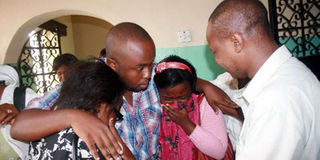Kiliku: Life and times of a brave politician

Children of the former Changamwe MP comfort one another at their family house in Tudor after Kiliku’s death on Friday, May 21. Photo/LABAN WALLOGA
As family members and friends put final plans for the burial of Kennedy Kiliku, they were unanimous that Coast Province had lost one of its most prominent figures.
The former Changamwe MP was both a rebel and a giant. When it was fashionable to toe the single-party line, Mr Kiliku was among the few to openly challenge the supremacy of regional Kanu kingpin Shariff Nassir, who died in November 2005.
In Parliament, Mr Kiliku earned a reputation as a brave crusader against the excesses of the one-party regime, cementing his reputation when he was elected to chair the Parliamentary Select Committee that investigated the first bouts of ethnic clashes in the Rift Valley.
It was no surprise that Mr Kiliku was an early convert when Kenya went multi-party at the end of 1991. In 1992 he retained the Changamwe seat on the ticket of Mr Mwai Kibaki’s Democratic Party.
The much-awaited Kiliku Report tabled in Parliament in September 1992 was a bombshell. It made specific recommendations towards establishing peace and resolving the long-term grievances around land.
The report also made recommendations for equitable distribution of government posts to all communities.
His committee recommended urgent and expeditious adjudication and issuing of title deeds to all the deserving.
Mr Kiliku was appointed to head the 13-man team of MPs to investigate the 1991-1992 Molo ethnic fighting in which dozens of people died, and hundreds were displaced.
Simeon Nyachae
In 2002, Mr Kiliku joined the Peoples Coalition of Kenya, made up of Ford People and Safina parties in backing Mr Simeon Nyachae for the presidency.
Mr Kiliku once declared his candidacy for presidency. In 2005, he said his quest for presidency in 2007 was meant to solve land problems and put an end to tribal warfare.
He died on Friday, 21 this month at 57.
He rose from a junior officer in the East African Railways and Harbours to rub shoulders with the high and mighty.
After losing his parliamentary seat to Mr Ramadhan Kajembe in 1997, Mr Kiliku immersed himself in trade union affairs and went on to capture the powerful seat of secretary-general of the giant Dockworkers Union in Mombasa.
He was to steer the union for five years until he was dislodged by Mr Simon Sang. His successor remembers him as a democratic leader who defied the culture of clinging on to power.
Mvita MP Najib Balala and Changamwe MP Ramadhan Kajembe described Mr Kiliku as an outstanding leader, who united people of different ethnic backgrounds.
Before his death, Mr Kiliku was operating private businesses.
His widow, Elizabeth Kiliku, said her husband fell ill at about 9pm shortly after taking dinner at his house in Tudor.
“His condition became worse and we decided to take him to hospital after giving him first aid. Unfortunately he was pronounced dead upon arrival,” she said.
Mr Kiliku has left behind the widow, five children and a grandson.




